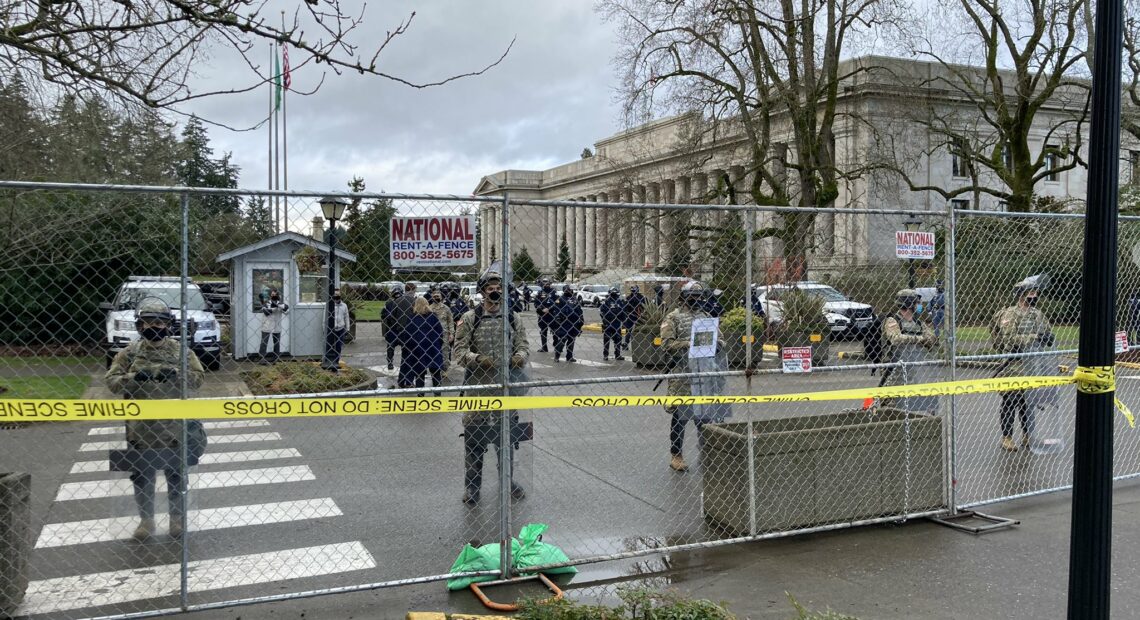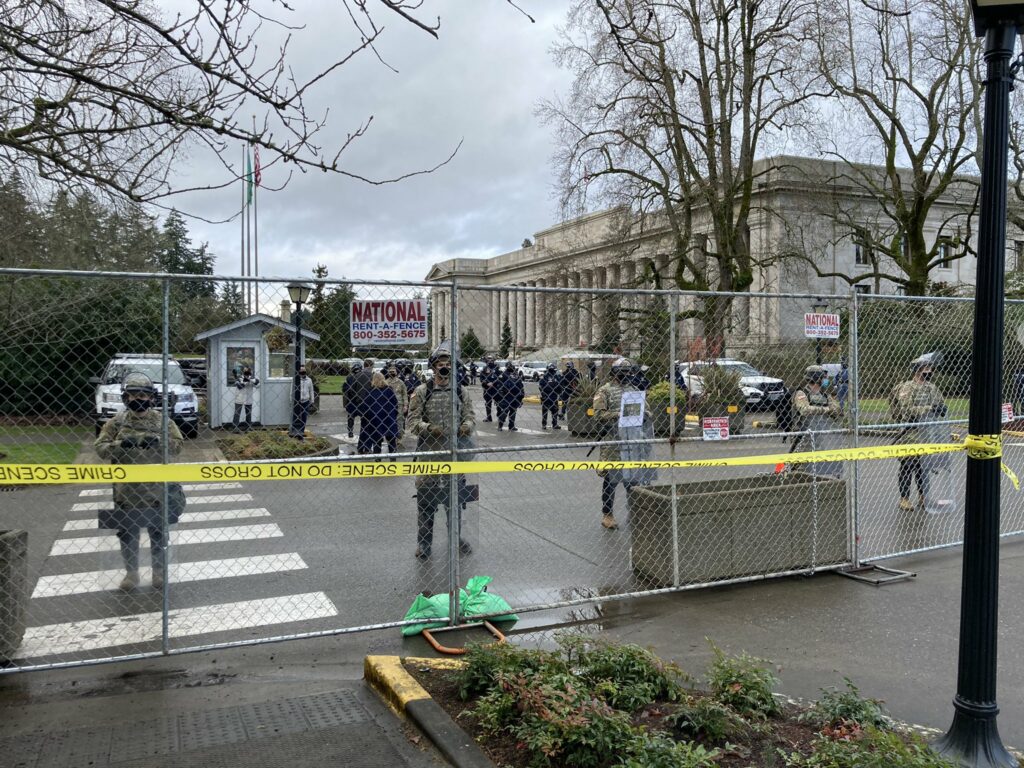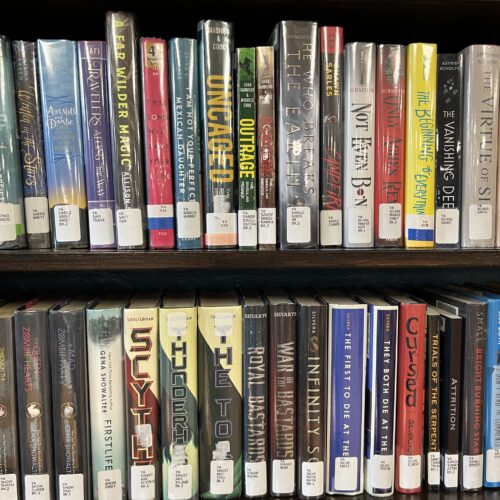
Washington’s 2021 Legislative Session Kicks Off Under The Cloud Of Heightened Security Concerns
WATCH
The Washington Legislature kicks off its 2021 session today. It comes with heavy security outside the building amid threats of protesters trying to force their way in.
The National Guard and Washington State Patrol set up a security perimeter over the weekend ahead of expected protests.
ALSO SEE: 5 Things To Know About Washington 2021 Legislative Session
Inside, lawmakers are meeting to approve the rules that will allow them to meet mostly remotely this year due to the pandemic. That could mean the session has fewer partisan policy disagreements – or more.
State lawmakers have a lot of work ahead of them in the long session to set a two-year state budget.
“I see (the 2021 session) going one of two ways: They may try to leave some of the more controversial stuff for another day, another year and maybe build some bipartisan coalitions,” Olympia correspondent Austin Jenkins said on a recent episode of NWPB’s Uniquely NW News program. “I could also see though that with Democrats having strong majorities, and the governor’s office, and the fact that things are very polarized now, that this could in fact be a very partisan session. Republicans are frustrated that the governor didn’t call them back into special session this year, so there’s some built up animosity and tension even out of the gates here. So, I’m not sure what we’re going to see, but this is going to be a unique and different session – on a lot of fronts.”

Washington National Guard troops set up outside the state Capitol Jan. 10, 2021, ahead of the session beginning on Monday, Jan. 11. Security is heightened after recent threats, following the Jan. 6 insurrection at the U.S. Capitol. CREDIT: Austin Jenkins/N3
Also kicking off Jan. 11 is a new way of classifying Washington for business reopening. Gov. Jay Inslee announced this more regional approach on Jan. 5. He has previously extended his restaurant and other business closure a few times, and now he’s offered a plan for a slow reopening.
It all comes with the backdrop of statehouse and executive security in the wake of a mob attack on the U.S. Capitol on Jan. 6. The same day, pro-Trump protesters, some armed, broke the gate at the Washington Governor’s residence and demonstrated outside the house, with state troopers keeping them at bay.
Now there’s a question of whether the 2021 legislative session will see similar security concerns.
Watch the full episode above. See more from NWPB’s Uniquely NW News and all NWPB videos on YouTube.
CONVERSATION HIGHLIGHTS:
(Edited for length and clarity)
On why Washington is moving to the more regional approach for COVID-related reopening:
Rather than looking county by county, they’re looking region by region with the idea of hospital services being the organizing principle behind those regions. The regions that share medical services and a big part of the metrics that they’re gonna be using to decide if regions can move into phase two and start to allow some indoor dining again, for instance, will be if for instance, the ICU bed capacity is not , making sure that positive COVID rates are on the decline not on the increase. So it is a new approach, it’s also a fairly slow approach because the reality is it’s just two phases. We’re in phase one, essentially or will soon be, phase two allows for 25% capacity in restaurants. So it’s not a full reopening at this point and there’s a lot of factors that could have regions going from phase two back to phase one if they start this flip. And of course, there’s the concern about this mutated version of COVID-19 that is more communicable, more contagious and if that shows up in Washington that could scramble all of these best laid plans.
On whether number of people getting a COVID-19 vaccine is part of the reopening evaluation:
– Vaccinations are not one of the four metrics they’re using, it is something they will be considering and watching, to be clear. But the reality is we like much of the country are really lagging right now in terms of getting these vaccinations into people’s arms. They are arriving, they’re here, but getting them administered has been a hurdle and so separate from but also related to clearly interrelated to this reopening is the need to figure out infrastructure that will allow for a faster administering of these vaccines, because clearly the infrastructure that’s in place right now, isn’t getting the job done that’s causing frustration. Now the governor has pointed to some hospital systems that seem to be hitting higher marks in the overall statewide effort. Just before the beginning of the year, we were seeing the state at 19% delivery of these or administration of these vaccines. It’s only 19% of the vaccines that the state had received had actually been administered for the beginning of the year. That’s highly concerning obviously to a lot of people.
On security concerns ahead of the session beginning:
Everybody is on high alert, and there’s a lot of concern about something similar happening in Olympia. We’ve already seen groups promising to show up at the Capitol to try to gain entrance to the Capitol building on the first day, the building will be closed to the public. However, lawmakers need to meet in person to approve the rules that are then going to allow them mostly meet remotely, so it’s sort of this irony. They have to show up in person in order to agree not to meet in person. So you’ve got far-right groups that are saying they’re gonna try to slip through the doors, get into the Capitol, occupy the public galleries above the houses and the chambers if they can, a lot of security planning going into this first day, speed patrol very much on heightened alert. Clearly they do not want a repeat of what happened at the US Capitol.
On five things to watch for the 2021 session:
This is unprecedented to have the legislature trying to meet and legislate remotely the house plans to be almost entirely remote, the Senate looking at more of a hybrid approach. So just the mechanics of this session is gonna be really interesting along with that heightened protest, polarized environment. It’s important to be paying attention to the big issues that majority Democrats are talking about tackling right away, they’re looking at some sort of COVID relief measure to augment what the governor has already done with Federal funds, $100 million dollar fund, grants for restaurants and other hard hit businesses. is asking legislators to approve another $100 million. They may also be deciding how the next round of Federal stimulus or relief dollar is spent but that can happen in January. Then, of course, police reform is a very hot topic, a lot of bills already are pre-filed and ready to go on that topic including banning chokeholds, creating some sort of independent investigative office or allegations of police excessive force, the governors of top issue, a longtime top issue is climate change and he’s gonna be pushing hard for a climate agenda including trying again for a low carbon fuel standard or clean fuel standard he calls it, they tried previously, haven’t gotten that passed. And then, of course, this is a budget writing year, two-year budget writing, writing a two-year budget. Democrats are talking about the capital gains tax again, so we’ll be watching for that to be sure.
On the 80-20 proposition – that 80 percent of what lawmakers do is very routine and bipartisan:
It’s true that a lot of what the legislature does is done in bipartisan even unanimous fashion and they kind of weighing themselves around the axle on that 20%. What I think is unclear at this point is on the one hand Democrats have been signaling especially house Democrats telling their members limit the number of bills you’ve introduced. Like try to not introduce super partisan bills that are going to tie up a lot of time on the floor. Let’s focus on some key areas like COVID relief and police reform and climate change, equity issues. So I can see it going one of two ways, they may try to leave some of the more controversial stuff for another day, another year and maybe build some bipartisan coalitions. I could also see though that with Democrats having strong majorities in both chambers and the governor’s office and the fact that things are very polarized now, that this could in fact be a very partisan session. Republicans are frustrated that the governor didn’t call them back into special session this year, so there’s some built up animosity and tension even out of the gates here.
On what may be pros and cons of the mostly remote session this year:
It’s true that instead of coming to Olympia, going to a committee hearing room and testifying for three minutes before a committee, now people will do that remotely. There is the possibility and some of the government advocates have said that as much that this could actually prove more inclusive and provide more opportunities for the public to engage. I mean, imagine if you are six hours away from Olympia … where it’s a long drive plus it’s wintertime and you have to cross a pass that the ability to testify from the comfort of your home could be very appealing and might make the legislature more accessible. But we also know that when there’s a computer screen between two people it is a barrier and it’s gonna be very different. I mean, they are gonna have to learn new ways to do their work because they’re not gonna be able to grab people as reporters do in the hallway. So it’s gonna be very different. Some ways will be perhaps more accessible, in many ways it will be less accessible.
Related Stories:

Washington state bill could change how rural communities could work to close a library
Young adult books at the Columbia County Library. Some people have requested to move the YA section into the adult section because of what they call “obscene” material in 100

Washington leaders try to find solutions for wolf depredations and killing of wolves
A gray wolf. (Credit: William Campbell) Listen (Runtime 1:07) Read Some ranchers are saying it is time to find creative ways to deal with wolf attacks on livestock. That’s what

Washington bill aims to reduce ‘fast fashion’ carbon emissions, pollution
Pollution and greenhouse gas emissions from the manufacture of fast fashion are growing just as fast as the industry. A new bill in Washington aims to help lessen the industry’s















